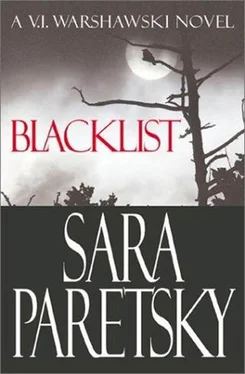I was glad I hadn’t tried to talk my way in: her family’s town home was in a five-story building, hidden from the street by a high stone wall and a wrought-iron door with opaque safety glass filling the curlicues. A microphone was set into a recess beside the door, where I could have bent over and tried to persuade someone inside to buzz me in.
Catherine unlocked the door and led me across a flagged courtyard. A little garden with a couple of fruit trees and an old stone bench lay on the east side of the building, continuing, as far as I could tell, around to the back. We walked up gray flagstones to the front entrance, also locked, and took an elevator to the fourth floor. No doorman. Catherine could come and go with no one seeing her.
The elevator opened onto what was essentially the apartment’s entryway, an area so big I could have set up my office there and no one would have tripped over me for at least a month. We went on through an arched doorway into the body of the apartment.
A middle-aged woman in a maid’s uniform came out from some back room. “Oh, it is you, Miss Katerina. And your friend?”
“A business acquaintance, Elsbetta. We’ll be in my room.”
“You want me to bring tea? Coffee? Juice?” Her English was precise, but her voice was soft and heavily accented, the “esses” slurred the way my father’s mother’s used to.
“We’re fine without anything,” Catherine said firmly: I was not a guest, I didn’t get refreshments.
“Were you here last night?” I asked Elsbetta. “Here? Yes, I sleep here.”
Catherine looked daggers at me, but she said, “This woman wants to know if I was here also.”
“What do you mean, was you-were you-here? Yes, of course you were here. You ate with friends, you came home, at ten-thirty you went to bed, so I also, I then went to bed.” Elsbetta turned to me. “When Mrs. Renee is not here, I stay awake until Miss Katerina is in bed.”
Catherine gave a tight, triumphant smile and led me to her room. It was decorated in bold colors, and furnished in a way that would remind you every time you came in that you had been born to special obligations-the Bang & Olufsen TV-stereo for starters, and then the antique armoire and desk, Navajo rugs worn enough to show they dated to the pre-Machine Epoch of Indian work. These lay on a hardwood floor so polished it reflected our legs as we walked across it. Another few were draped across a pair of ottomans in front of the working fireplace.
The room overlooked the back garden. I opened the French doors and looked out on a small balcony. You wouldn’t have to be a great athlete, only reasonably confident, to move from the balcony to a fire escape screwed into the brickwork about a yard away.
“So you went to bed at ten-thirty, you waited until Elsbetta’s light went out, then you climbed down, went out the back gate and headed for the western suburbs. You have a driver’s license, or anyway access to a car. You did your business out at the Larchmont estate, and retraced your steps. Only you were so worn out that you overslept and missed your algebra class this morning.”
She scowled ferociously. “What are you trying to prove, that you can stalk me? You know that’s against the law in Illinois.”
“Lots of things are against the law here. I’m not stalking you-I’m just
a reasonably competent investigator. If I wanted to go to the trouble, I could probably find traces of your clothes on that fire escape: rough metal like that always snags some fibers.”
While she tried to think of a response, I went over to inspect the photographs on the mantelpiece. Calvin Bayard and an eight-or nine-year-old Catherine fly-fishing, he with his easy smile, she with her face furrowed in intensity. Calvin with a short dark woman; Catherine with the same woman. Various other family groupings. It wasn’t immediately clear which ones were her parents.
“What do you have that’s mine?” she demanded of my back.
“Your little teddy bear. It came off your backpack in my hand when you broke away from me Sunday night.”
“Oh. That. You can keep it.”
I could see her in a mirror over the mantel. Her little face was pinched with anxiety. She wasn’t as unconcerned as she was trying to sound.
“Did you not know Marcus Whitby was dead when you went back last night?” I spoke to the trophies, keeping an eye on her in the mirror. “What are you talking about?”
“You must have been worried when he missed your rendezvous on Sunday. Or did you just assume I had frightened him off?”
“I don’t know any Marcus Whitby, so stop trying to pretend you’re, like, Jack McCoy.”
I swung around to look at her. “You don’t know Marcus Whitby? The man I fished out of the Larchmont pool? You don’t know he’s dead?” Her eyes and jaw opened in what looked like genuine bewilderment. “You found a dead man out there? What happened to him?”
“Don’t you look at the paper or the news? When you log onto your fancy computer there, doesn’t CNN or NBC or something come up to tell you what’s happening outside the Gold Coast?”
She stiffened. “For your information, I’m very involved in current events. But that doesn’t mean I read about every dead person in the world. Is that why you were at Larchmont? To look for him? Who was he?”
I sat down on one of the ottomans in front of the fireplace and gestured to her to take the other. “Marcus Whitby worked for T-square magazine.” She gave the elaborate shrug of adolescent indifference.
“Black arts and entertainment, middle class.” When she continued to mime ignorance, I added, “He wrote a piece on Haile Talbot. I thought maybe that was how you met.”
“I don’t know him. Marcus whoever, I mean. And I hardly know Haile Talbot. Just because I did PA stuff for him doesn’t mean I hung out with him when he did media. He had a publicist who took care of that.”
“Then who were you meeting out at Larchmont?”
She bit her lips. “No one. I was there on a dare. You caught me fair and square. Now you can give me my teddy back and go home.”
I shook my head. “No. I know you were there again last night, so even if I was gullible enough to believe-“
“And you say you’re not a stalker?”
I ignored the interruption. “I told you at the get-go that it was me or the cops. Since you won’t talk to me, it’s the cops. You were at the scene of a mysterious death, a crime scene, you fled, they will be incredibly interested in you. The good news is they’ll only talk to you with your parent or guardian present. So-your dad, your mom, your grandparents-which one of them should I explain this to?”
Her eyes darkened with dismay, but, before she could say anything, someone tapped on her door, and immediately opened it. The short dark woman from the photographs swept in, moving across the room to Catherine like the Wabash Cannonball.
The Wabash Cannonball
Gran!” Catherine jumped and looked from her grandmother to me in alarm. “What are you doing home so early?”
Renee Bayard leaned over to kiss Catherine. She was older than in the mantel photos. Her dark hair was now well streaked with gray, but her skin was remarkably smooth and clear under its light foundation. Her red dress, made from a wool so soft I had an impulse to stroke it, looked as though it had been cut to fit her short, square body. A bracelet of ivory mahjongg tiles clacked when she put her arms around her granddaughter.
“I felt tired of the same meetings churning over the same stale material. I want to get to your school tonight for the parents’ meeting on what we can do with all these justice Department efforts to look at student files, so I thought I’d come home first, have a family supper if you’re not already engaged.”
Читать дальше












